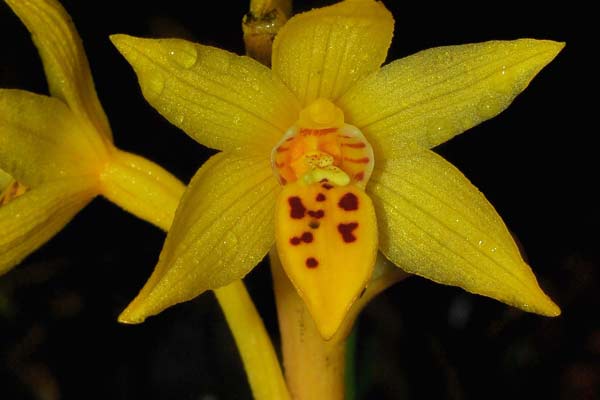Tourist finds new species of orchid
Updated: 2013-04-18 01:17
By Cheng Yingqi (China Daily)
|
||||||||
|
 |
|
The leafless orchid has been confirmed as a new species. Zhai Junwen / FOR CHINA DAILY |
Scientists have confirmed that an orchid found by a tourist in South China is a new species.
Uniquely, the orchid is entirely yellow, has no leaves for photosynthesis and carries the biggest seeds of all known orchids.
Named by scientists as Danxiaorchis sinchiana, it was discovered in the remote mountains of Shaoguan, Guangdong province, by tourist Zhu Jiaqiang.
In May 2010, Zhu and some friends were hiking in Danxia when Zhu was astonished to see six beautiful orchids growing in a grassless area.
Zhu took photos of the orchids and put them on the Internet, attracting the attention of botanists.
Zhai Junwen, from the Chinese Academy of Sciences' South China Botanical Garden, said, "It is different from any orchid species recorded. When I saw Zhu's photo, I saw it was very special, so I contacted him immediately."
Scientists from the garden, the National Orchid Conservation Center and the Shenzhen Orchid Conservation and Research Center went to the mountains with Zhu.
After careful research efforts, they concluded it is a new species. Their research was published in Plos One, a US science journal, on April 4, and this week the scientists held a news conference to announce the discovery.
Liu Zhongjian, a senior expert with the Asia branch of the International Union for Conservation of Nature's orchid group, said, "The discovery of Danxiaorchis sinchiana has enriched the diversity and gene bank of the orchid species, and the special structure of the seed provides a new research interest for orchid evolution."
Liu referred to the Danxia landform, found only in southeast and southwest China and which consists of red-colored sandstones and conglomerates largely from the Cretaceous.
"The discovery reconfirmed the specificity of the Danxia landform, enriched the diversity and improved the visibility of biodiversity research on it," Liu said.
The orchid is not the first new species found in the region, with some plant species previously reported in the area.
However, human activities have limited the range of orchid species.
Liu suggested authorities build a protection zone for the new species and start gene research for a possible reproduction study.
So far, scientists have found 21 individual Danxiaorchis sinchiana, with the total number estimated at less than 100.

 Li Na on Time cover, makes influential 100 list
Li Na on Time cover, makes influential 100 list
 FBI releases photos of 2 Boston bombings suspects
FBI releases photos of 2 Boston bombings suspects
 World's wackiest hairstyles
World's wackiest hairstyles
 Sandstorms strike Northwest China
Sandstorms strike Northwest China
 Never-seen photos of Madonna on display
Never-seen photos of Madonna on display
 H7N9 outbreak linked to waterfowl migration
H7N9 outbreak linked to waterfowl migration
 Dozens feared dead in Texas plant blast
Dozens feared dead in Texas plant blast
 Venezuelan court rules out manual votes counting
Venezuelan court rules out manual votes counting
Most Viewed
Editor's Picks

|

|

|

|

|

|
Today's Top News
Boston bombing suspect reported cornered on boat
7.0-magnitude quake hits Sichuan
Cross-talk artist helps to spread the word
'Green' awareness levels drop in Beijing
Palace Museum spruces up
First couple on Time's list of most influential
H7N9 flu transmission studied
Trading channels 'need to broaden'
US Weekly

|

|








